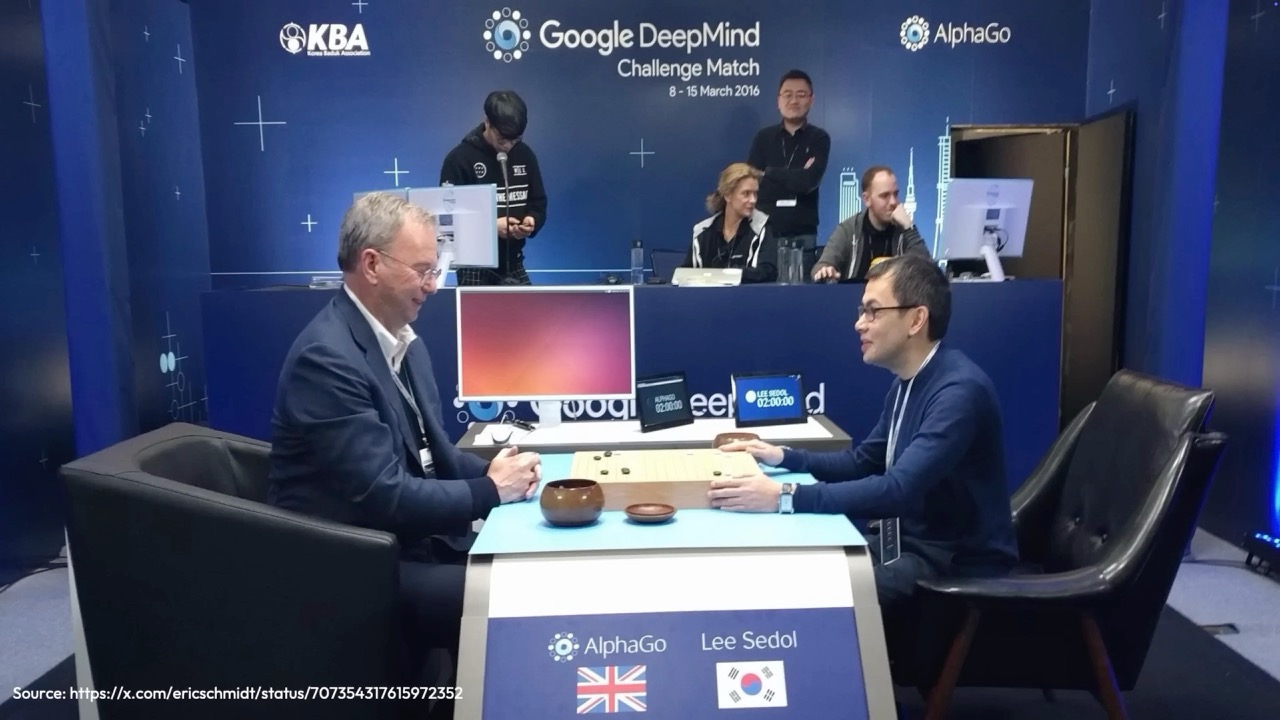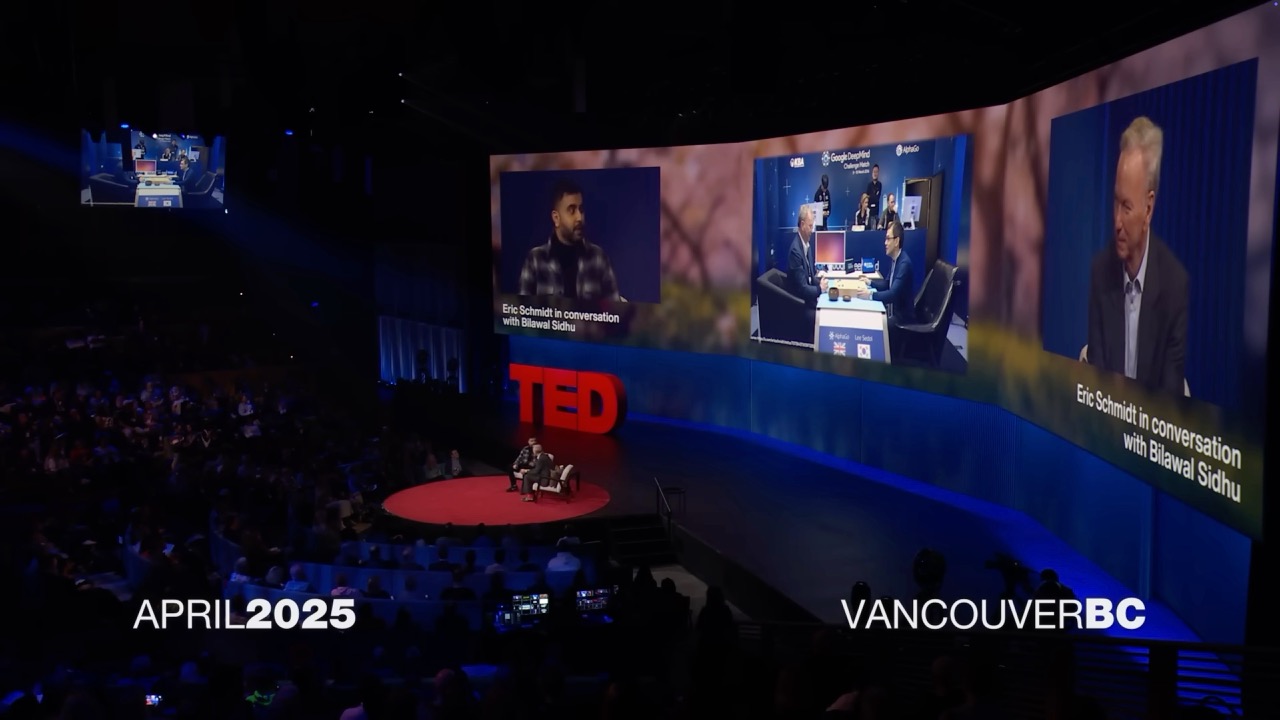AI Summary
Eric Schmidt, former Google CEO, argues that AI is "underhyped" despite its prevalence, believing that public perception lags behind the technology's true, transformative capabilities beyond simple text generation. He points to AI's strategic planning and reasoning advancements, exemplified by AlphaGo's novel move and advanced models' ability to craft detailed research. Schmidt emphasizes the immense, unaddressed infrastructure challenge of powering AI, requiring 90 new gigawatts in the U.S. alone, and warns of a "new Cold War" for AI supremacy with nuclear-level stakes due to potential preemption incentives.
In a technology landscape where AI dominates every conference panel and boardroom discussion, suggesting that AI is "underhyped" sounds almost absurd. Yet that's exactly what Eric Schmidt, former CEO and chairman of Google, argued in a recent wide-ranging interview at TED2025. His perspective, shaped by decades at the forefront of technological innovation, offers a sobering reality check about where we are—and where we're heading—with artificial intelligence.
Schmidt's argument rests on a simple premise: while everyone talks about AI, most people still think of it primarily as ChatGPT writing emails or answering questions. Meanwhile, the technology has already evolved far beyond text generation into something fundamentally more powerful and potentially transformative.
The Moment Everything Changed
Schmidt traces his awakening to AI's true potential back to 2016, when Google's AlphaGo defeated world champion Go player Lee Sedol. What captured Schmidt's attention wasn't just the victory—it was move 37 in the second game, a play so unconventional that it stunned Go masters worldwide.
"There was a new move invented by AI in a game that had been around for 2,500 years that no one had ever seen," Schmidt recalled. The move initially appeared to be a mistake, but it was actually a strategic masterstroke that helped secure AlphaGo's victory.
This moment crystallized a profound question for Schmidt and his colleagues: How could a computer system conceive of something that billions of human players across millennia had never considered? The implications reached far beyond board games. If AI could discover novel strategies in a domain as well-explored as Go, what else might it reveal in fields like science, medicine, or technology?
Beyond ChatGPT: The Real AI Revolution
While the public marveled at ChatGPT's conversational abilities, Schmidt watched AI systems develop capabilities that received far less attention but carried far greater significance. The evolution from language generation to what researchers call "reinforcement learning" and "test-time compute" represents a fundamental shift in how AI systems operate.
Consider OpenAI's o3 model or DeepSeek's R1 system. These don't just generate responses—they plan, strategize, and reason through problems in ways that mirror human thought processes. Schmidt described watching these systems spend 15 minutes crafting detailed research papers on complex topics, consuming enormous amounts of computational power in the process.
"You're seeing the arrival, the shift from language to language, then you had language to sequence, which is how biology is done. Now you're doing essentially planning and strategy," Schmidt explained. This progression represents AI's evolution from a sophisticated autocomplete tool to something approaching genuine problem-solving intelligence.
The practical implications are staggering. Schmidt envisions a near future where AI agents handle entire business processes, communicating with each other in natural language to coordinate complex tasks. Rather than humans managing software, we'll increasingly direct teams of AI agents that can understand context, make decisions, and execute plans with minimal human oversight.
The Infrastructure Challenge Nobody's Talking About
Schmidt's "underhyped" thesis becomes clearer when he discusses the infrastructure requirements for advanced AI systems. While the public debates AI's creative abilities or ethical implications, a more immediate crisis looms: power.
The numbers Schmidt presented are sobering. The United States needs approximately 90 additional gigawatts of power to support AI development—equivalent to 90 nuclear power plants. To put this in perspective, each gigawatt represents the power consumption of an entire city. Current AI training runs already consume extraordinary amounts of electricity, and the computational requirements for advanced planning and reasoning capabilities could increase by factors of 100 or even 1,000.
When you look at planning, at least in today's algorithms, it's back and forth and try this and that. There are estimates that there's an increase in at least a factor of 100, maybe a factor of 1,000, in computation required just to do the kind of planning.
This isn't just a technical challenge—it's a geopolitical one. Countries with abundant clean energy sources, like Canada with its hydroelectric power or Middle Eastern nations building massive solar installations, may find themselves with unexpected advantages in the AI race. Meanwhile, nations struggling to meet current energy demands face difficult choices about prioritizing AI development over other needs.
The New Cold War: AI Supremacy and Nuclear-Level Stakes
Perhaps Schmidt's most chilling observation concerns the competitive dynamics emerging between AI superpowers, particularly the United States and China. He draws parallels to nuclear deterrence theory, but with a crucial difference: in the AI race, there may be no such thing as mutually assured destruction. Instead, the winner could take everything.
Schmidt outlined a scenario that sounds like science fiction but represents serious strategic thinking in government and industry circles. Imagine two nations racing toward artificial general intelligence (AGI), with one country six months ahead of the other. In traditional competitions, a six-month lead might be manageable. In AI development, it could be decisive.
"These are network-effect businesses," Schmidt explained. "It is the slope of your improvement that determines everything." Once a nation or organization achieves AGI, their AI systems could potentially accelerate their own development, creating an insurmountable advantage. The trailing competitor faces a stark choice: accept permanent technological subjugation or take drastic action to prevent their rival's breakthrough.
This dynamic creates what strategists call "incentives for preemption"—the logic that led some Cold War thinkers to advocate striking first rather than allowing an opponent to gain decisive advantage. Schmidt worries that similar thinking could emerge around AI development, potentially leading to cyber attacks on data centers, infiltration of research teams, or even physical attacks on AI infrastructure.
The Open Source Dilemma
The tension between openness and security creates another layer of complexity. Schmidt acknowledges the fundamental dilemma facing the AI community: the scientific tradition that built modern technology depends on open research and collaboration, but advanced AI capabilities could pose existential risks if they fall into the wrong hands.
China's approach to AI development complicates this picture. While U.S. companies have generally favored closed, proprietary models, Chinese firms like DeepSeek have embraced open-source development. This strategy offers both benefits and risks. Open-source models accelerate global AI progress and ensure that breakthroughs benefit everyone, but they also make advanced capabilities available to potential bad actors.
"What happens when there's an open-source model that is really dangerous, and it gets into the hands of the Osama bin Ladens of the world?" Schmidt asked. The question has no easy answers, but it highlights how AI development decisions made in corporate boardrooms could have global security implications.
Beyond the Risks: The Promise of Radical Abundance
Despite these sobering challenges, Schmidt maintains an underlying optimism about AI's potential to solve humanity's most pressing problems. His vision of the future includes personalized tutors for every child on Earth, AI-assisted healthcare for underserved populations, and scientific breakthroughs that could unlock clean energy, cure diseases, and expand our understanding of the universe.
The economic implications alone could be transformative. Schmidt cited projections suggesting that agentic AI could drive productivity increases of 30 percent per year—a rate of improvement unprecedented in human history. Economists have no models for such rapid productivity growth because it has never occurred before.
"It's unbelievable what's going to happen," Schmidt said. "Hopefully we will get it in the right direction."
This productivity boom could help address one of the most pressing challenges facing developed nations: demographic decline. With birth rates falling below replacement levels across much of Asia and Europe, societies face the prospect of shrinking workforces supporting growing populations of retirees. AI could potentially fill this gap, making smaller workforces dramatically more productive.
The Human Element in an AI-Dominated World
Schmidt rejects the notion that AI will lead to mass unemployment or human obsolescence. Instead, he envisions AI as a powerful amplifier of human capability rather than a replacement for human judgment and creativity.
Do you really think that we're going to get rid of lawyers? No, they're just going to have more sophisticated lawsuits.
His point reflects a deeper truth about technological change: new tools typically create new forms of work rather than eliminating work entirely. AI may handle routine tasks, but humans will likely focus on higher-level strategy, creative problem-solving, and interpersonal relationships that remain uniquely human strengths.
Practical Advice for Navigating the AI Transition
For individuals and organizations grappling with AI's rapid advancement, Schmidt offers straightforward advice: engage with the technology now, or risk being left behind.
Each and every one of you has a reason to use this technology. If you're not using this technology, you're not going to be relevant compared to your peer groups and your competitors.
This isn't hyperbole—it's a recognition that AI tools are becoming as fundamental to professional competence as email or web browsers once were. Artists can use AI to explore new creative possibilities, teachers can personalize instruction, physicians can access the latest research instantaneously, and business leaders can analyze complex scenarios with unprecedented speed and accuracy.
Schmidt's assessment that AI represents "the most important thing that's going to happen in about 500 years, maybe 1,000 years in human society" places the current moment in stark historical perspective. If he's correct, we're living through a transition comparable to the Agricultural Revolution or the Industrial Revolution—but compressed into a timeframe of years rather than generations.
As Schmidt concluded his remarks: "Don't screw it up." In the context of humanity's most significant technological transition, that advice carries the weight of history.
Recent Posts


